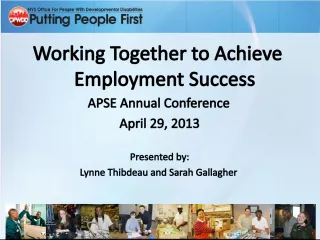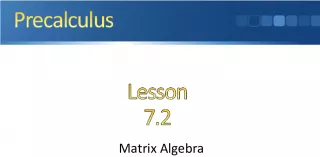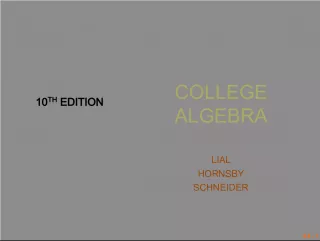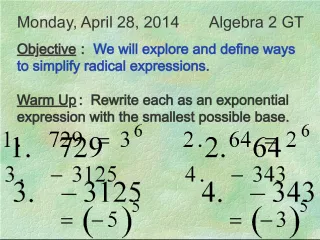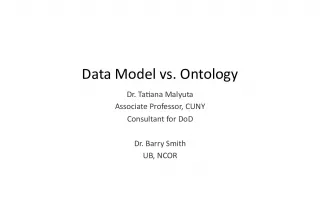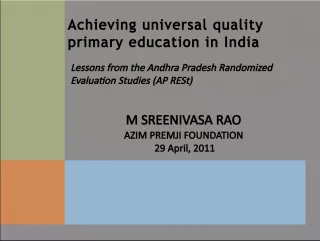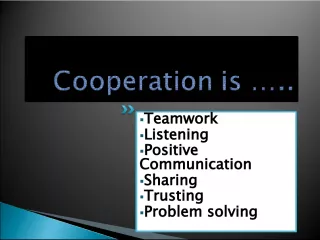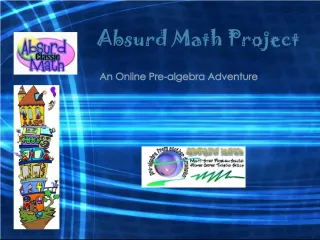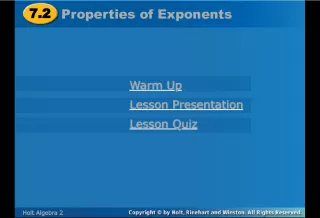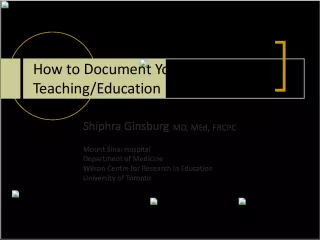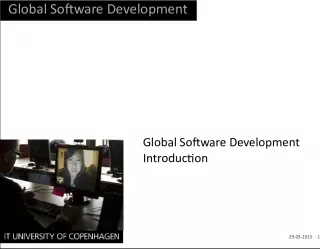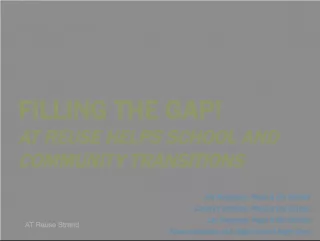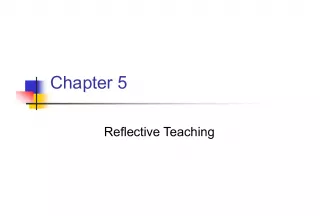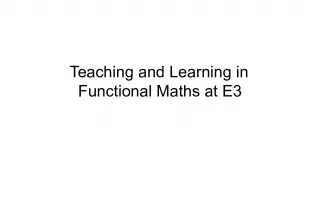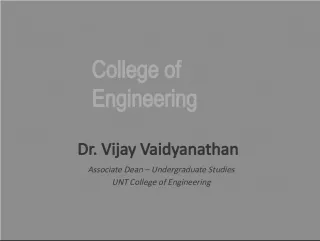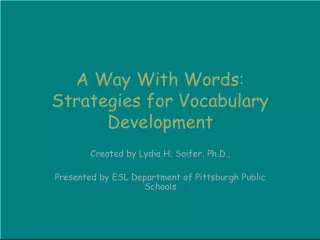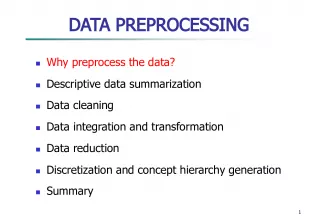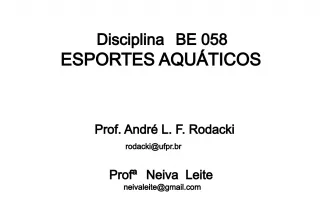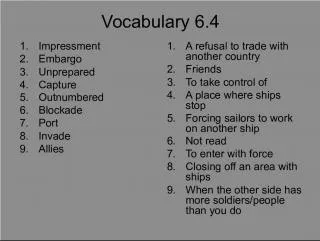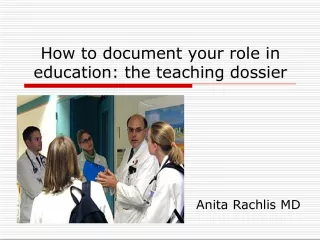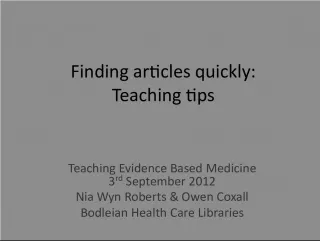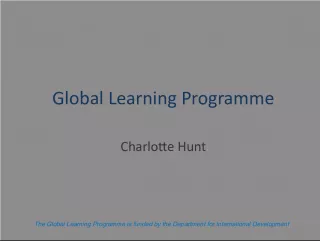Achieving Algebra Success: Collaboration, Data, and Co-Teaching
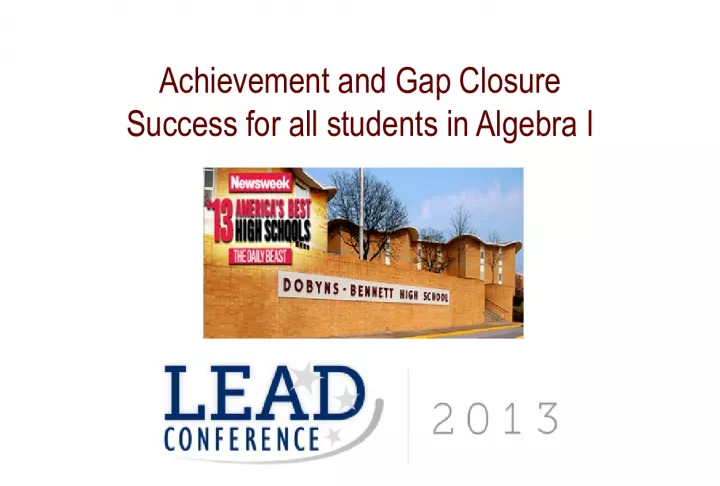

Join Chris Hampton and Travis Free of Dobyns Bennett HS as they highlight the power of co-teaching and intentionality in achieving success for all Algebra I students, including those with learning disabilities or economic disadvantages. With data-driven research and high expectations, they'll share their strategies for closing achievement gaps and ensuring all students thrive.
- Uploaded on | 1 Views
-
 ellac01
ellac01
About Achieving Algebra Success: Collaboration, Data, and Co-Teaching
PowerPoint presentation about 'Achieving Algebra Success: Collaboration, Data, and Co-Teaching'. This presentation describes the topic on Join Chris Hampton and Travis Free of Dobyns Bennett HS as they highlight the power of co-teaching and intentionality in achieving success for all Algebra I students, including those with learning disabilities or economic disadvantages. With data-driven research and high expectations, they'll share their strategies for closing achievement gaps and ensuring all students thrive.. The key topics included in this slideshow are . Download this presentation absolutely free.
Presentation Transcript
1. Achievement and Gap Closure Success for all students in Algebra I
2. Who are we? • Chris Hampton - Principal • Travis Free – Math Teacher • Dobyns-Bennett High School – Kingsport City Schools – 1850 students – 145 teachers/ 8 Algebra I teachers – 10.8% BHN – 42% Economically Disadvantaged – 16% Sped
3. Goals for Today? • Detail the Power of Collaboration • Data, research, and intentionality in work is critical • Co-teaching is a powerful tool for meeting the needs of SWD • Routine and high expectations are a must
4. Where were we (2011-12)? • Poor achievement (61.6%) and growth (-4.2/NDD) • Collaboration was surface only • Common assessments were in place for data discussion, but little collaboration on student learning • Failed to meet sped or BHN target • Questions regarding effectiveness of co-teaching for sped
5. Algebra I Achievement Data 11-12 vs. 12-13
10. What does Algebra 1 look like at DBHS? • Regular Algebra 1- paced over one year • SPED Algebra 1-paced over two years
11. How did we identify our strategies/focus? • Strategies we used in both classes: – Sticking with a topic long enough for fluency to develop…required streamlining the curriculum – 80% of our students are mastering 80% of the content – Spreadsheets for projections and highlight/monitor throughout the year – 3 practice EOC assessments throughout the year – Criteria focused • My projection is and is it where I should be? • How many more questions do I need to answer to move up a level?
12. Estimated Proficiency Levels
15. How did we identify our strategies/focus? • Regular Algebra 1 strategies: – Scheduled/weekly team collaboration – Research on assessment and best practices for teaching and individual teacher intervention – Previewing specifically through intentional openers consistently implemented across the department – Building fluency through intentional practice and through spiraling homework, openers, and assessments
16. How did we identify our strategies/focus? • SPED Algebra 1 strategies: – Inherent faith that our students could succeed – Co-Teaching model with regularly scheduled collaboration – Paced curriculum for SWD over two years – Develop a routine for instruction • Mon/Tues – new material/same problems as block Alg IA/B • Wed – review with manipulatives/small group instruction • Thurs – Spiraled assessment • Fri – Intervention/Corrections/Enrichment (CCSS tasks this year)
17. What went well? • Struggled in defining what collaboration was and wasn’t • By the end of the first 9 weeks collaboration was developing in pockets • By second semester all team meetings focused around student learning and not about a test • Schedule/pacing and routine
18. Pacing Guide
19. What went well? • Building relationships with students • Identified Power Standards that were necessary for student growth/proficiency • Development of four team teachers professionally • Team teaching with sped/general ed teams to present THE Algebra I curriculum to students with disabilities. • Structured, collaborative, and very intentional • Custom Student Reports (data-focus)
20. Challenges and plans to address? • Collaboration – Reinforce the fact that there is no arrival point – Freely sharing data and class level-success and failures – Always bringing the focus to student learning and growth. – Our focus is not EOC but preparing for the next course/college-readiness – Consistency in teams
21. Challenges and plans to address? • Co-teaching is a work in progress and can be a struggle – Consistency in team make-up – Professional Development within the team and throughout our school • Attendance for SWD has proven to be a challenge – Trying to build relationships with students – Provide opportunities for early success – Make kids a part of the progress monitoring/understand projections
22. Collaboration • Bi-weekly (now weekly) team meetings that are department and subject specific. • Required agenda. • Evidence of student- specific data conferencing.
23. Custom Student Reports • Making sure everyone is adequately trained on how to use TVAAS data.
24. Custom Student Reports • Using the data that is made available to schools.
25. Evaluation Process • Pre-conference conversation – Bring their CSR’s marked up – Prepared to discuss how they are specifically planning for the success of these students (grouping, assessments, etc.)
26. Custom Student Reports • Identifying key areas to target.
27. What have we learned? • Collaboration is powerful and works • Collaboration is hard and takes time and persistence • Data, research, and intentionality in work is critical • Consistency on teams is critical/Strong teachers • Co-teaching works for SWD • Routine and high expectations are a must • Students want to excel and want to be pushed
28. Questions?
29. Contact Information champton@k12k.com tafree@k12k.com
